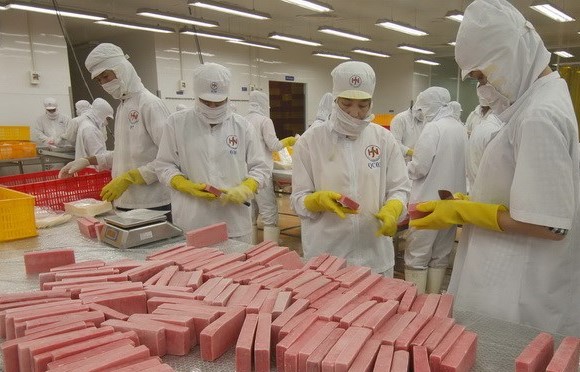 Economy
Economy


|
| A tuna processing line at the Hồng Ngọc Seafood Processing Company, a private firm in Hòa Hiệp Industrial Park in the southern province of Phú Yên. — VNA/VNS Photo Vũ Sinh |
HÀ NỘI — Việt Nam is unlikely to reach its target of one million enterprises with efficient operation by 2020, according to a draft report recently issued by the Ministry of Planning and Investment (MPI).
The draft report, reviewing the implementation of the Government's Resolution 35/NQ-CP on supporting and developing enterprises in 2016-20, shows that in the five-year period, the Vietnamese private sector cannot achieve goals set for contribution to gross domestic product (GDP) and total social investment.
Five years ago, the ministry expected the private sector would contribute 48-49 per cent to GDP by 2020, however, the rate is now about 43 per cent.
In the period, the GDP growth rate of the private sector was not the highest, but only lower than the foreign investment sector’s GDP growth rate.
The ministry said that the trend of the private sector’s GDP growth rate is going up, especially in 2018 and 2019, with the rate higher than the national growth rate at 7.3 per cent and 8.9 per cent, respectively. Meanwhile, the foreign investment sector’s tended to drop markedly.
“There is still a lot of room to promote the private sector's contribution to the economy, posing a big problem for the strategies and policies in the future,” the draft said.
“If the upwards trend is maintained and makes a breakthrough, the target of contributing 48-49 per cent of GDP can be achieved soon,” the ministry said in the report.
In terms of total social investment, the private sector is set to contribute 49 per cent to this area by 2020, however the rate is now 46 per cent.
The ministry said that although the figure is now lower than the target, it has steadily increased compared with previous years (43.2 per cent in 2018 and 46 per cent in 2019).
“This is a good sign that many resources of investment capital are being effectively mobilised for total social investment.”
The ministry said that Việt Nam would achieve the targets of the total factor productivity (TFP), which accounts for 30-35 per cent of GDP and the social labour productivity, which annually increases five per cent.
It will also gain around 30-35 per cent of local businesses engaging in creative and innovative activities every year as set.
The resolution 35 was inked by Prime Minister Nguyễn Xuân Phúc on May 16, 2016. — VNS




